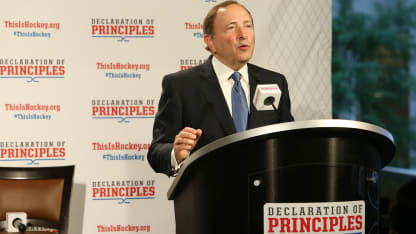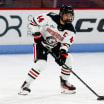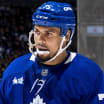BOCA RATON, Fla. -- The NHL is leading and furthering the discussion on the ways to ensure a safe and positive atmosphere for culture and inclusion in hockey during a two-day summit it is hosting at the Waterstone Resort & Marina.
Hockey summit hosted by NHL focuses on inclusion, culture across sport
Organizations, governing bodies discuss ensuring positive environment

The summit, which began Wednesday and concludes Thursday, has brought together representatives from 12 leagues, associations or governing bodies, including the NHL, NHL Players' Association, American Hockey League, USA Hockey, Hockey Canada, Canadian Hockey League, National Women's Hockey League and NCAA.
"I give a lot of credit to the organizations that came in today," NHL Deputy Commissioner Bill Daly said, "because they came in prepared to talk about the issues, they had they had great presentations, very substantive, and it's going to lead to a good dialogue tomorrow. I think the focus on an important issue like creating welcoming environments to grow the sport is so much higher today than it was even two or three years ago."
RELATED: [Hockey Is For Everyone coverage]
The summit is designed to use hockey's Declaration of Principles, unveiled by the NHL and NHLPA in September 2017, as the bedrock for all discussions and idea exchanges.
The Declaration of Principles is a collaborative document aimed at creating the best possible experience for the hockey community through policies, programs and initiatives that build character, foster positive values and develop important life skills that transcend the game.
It's the third consecutive year the NHL has held a summit overlapping with the general managers' meetings, which ran Monday through Wednesday. The summit in 2018 focused on concussions, and player safety was the subject last year.
"It's people in a room that were never in a room together before sharing best practices, sharing ideas, talking about the principles and how they can be better," said Hockey Hall of Famer Pat LaFontaine, a driving force behind the creation of the Declaration of Principles. "What was fun for me to watch was just the engagement, and then watching other commissioners and other leagues say, 'You know what, that's a great idea.'"
On Wednesday, the NHL began the summit with a presentation focused on hockey through the lens of culture, inclusion and demographics at the youth sports level and growing from there.
That was followed by presentations from each of the leagues, organizations and governing bodies in attendance on leadership in the game, where it stands from a culture and inclusion standpoint, and the practices they are using to foster further development.
"It was really around three things: evaluating how you're doing, give us something you do well and that you're proud of, and a challenge you see," said former NHL forward Kevin Westgarth, the League's vice president of business development and international affairs. "I was thrilled that they used that to go in a number of different directions. We heard echoes across, especially challenges. We heard about great initiatives, programs and policies that are out there."
Brian Blake, NHL senior director of diversity and inclusion, said he was impressed with a program the ECHL has been undertaking to get school-age kids to their games on what they're loosely calling education-training days.
"Why that's so important is because there are people, because of misperceptions and things of that nature, that don't understand that this is a sport that they can be a part of," Blake said. "I don't think they walk around thinking, 'Oh, they don't want me there,' I just think they don't understand they can be part of it. They're doing the right thing, bringing it to them. As demographics shifts are showing us, we need to bring the sport to them."
The summit concludes Thursday with the representatives dividing into breakout groups before returning to the main group for discussion on culture in the game, followed by an exchange of ideas for what can and should still be done.
The summit is in many respects a continuation of the NHL's four-point plan, announced by Commissioner Gary Bettman at the Board of Governors meeting in December, to create programs aimed at sensitizing people and raising awareness across the landscape of the game to abusive behavior of any kind.
At the time, Commissioner Bettman announced that the League notified all team executives that it would be mandatory to immediately report any on-ice or off-ice incidents of abusive conduct involving NHL personnel to either him or Deputy Commissioner Daly.
Deputy Commissioner Daly said the reporting from the teams has been extensive, but there are no major scandals under investigation.
"I think communication has reached a higher level of sensitivity, and I think that's great because we don't like surprises," Commissioner Bettman said.
The League is also in the process of developing education training programs focused on diversity and inclusion designed for team executives and coaches at the NHL and minor league levels. Deputy Commissioner Daly said they would all be trained prior to next season.
In addition, the Deputy Commissioner said the League's platform to allow for reporting of incidents, anonymously if necessary, should be up and running by June 1.
"It all comes back to the character values in the game," LaFontaine said. "It's not all about winning or losing. It's about the greatest value of the game is character development and the values and life skills we all have learned, and we have to continue to make that an age-appropriate experience so that everybody has that emotional connection to the game."
















